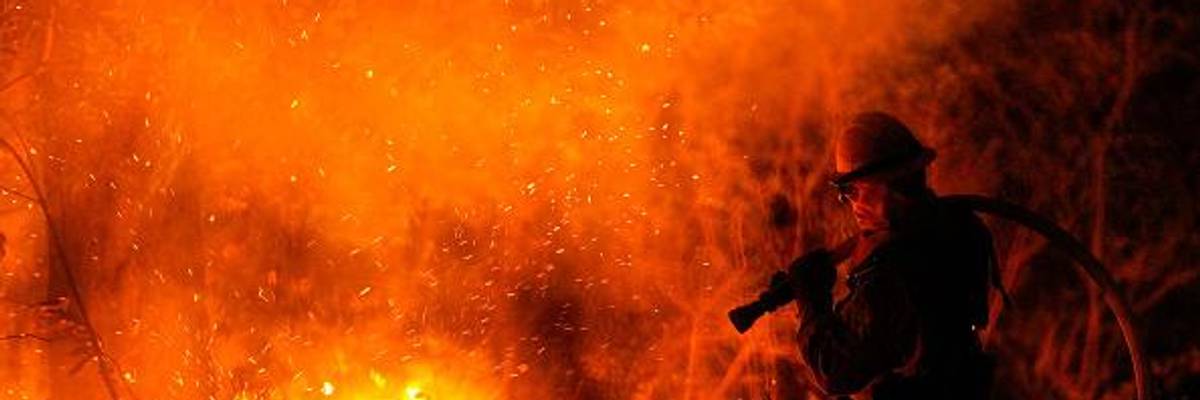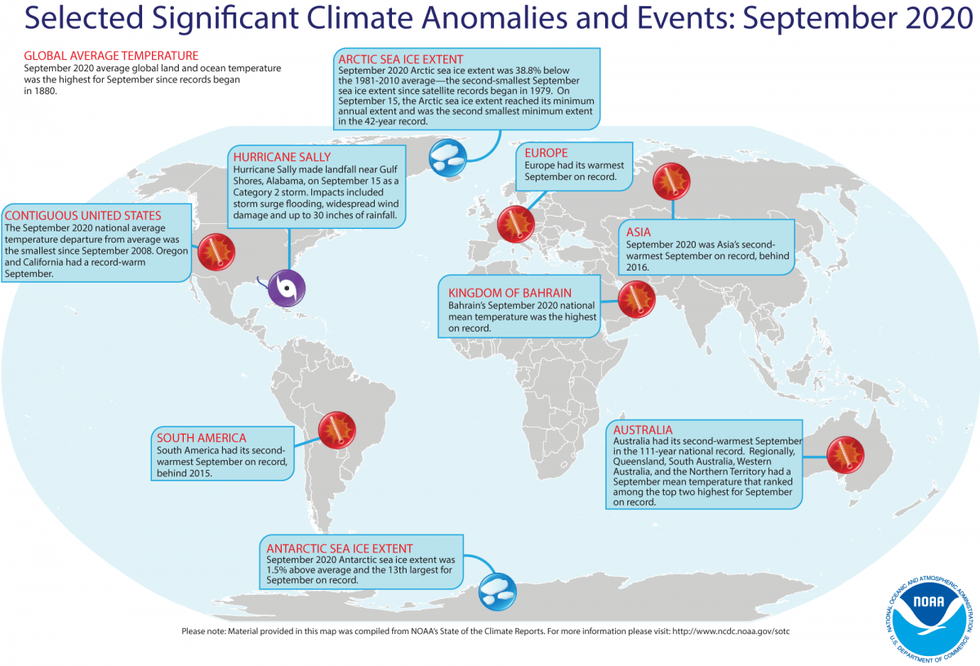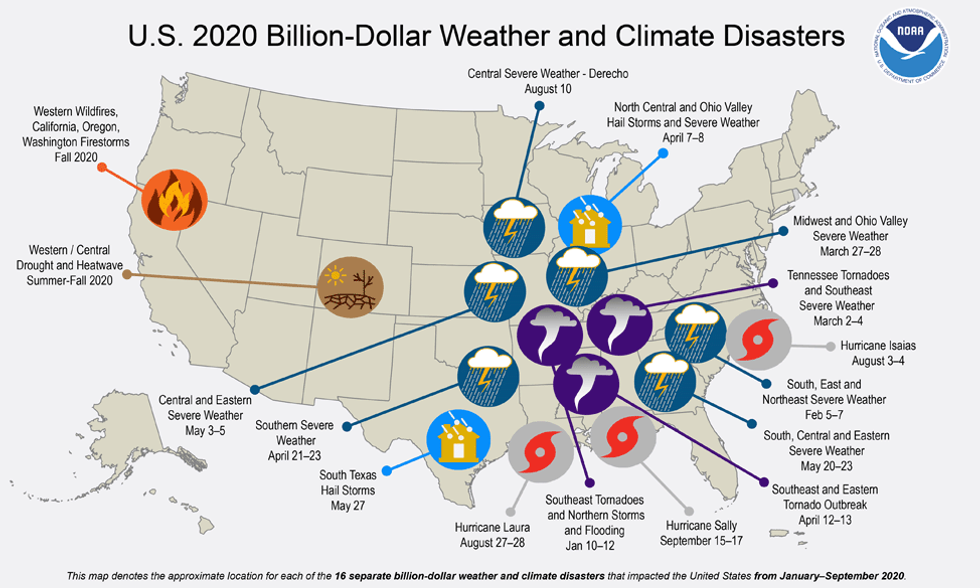

SUBSCRIBE TO OUR FREE NEWSLETTER
Daily news & progressive opinion—funded by the people, not the corporations—delivered straight to your inbox.
5
#000000
#FFFFFF
To donate by check, phone, or other method, see our More Ways to Give page.


Daily news & progressive opinion—funded by the people, not the corporations—delivered straight to your inbox.

Firefighters perform structure protection against the Glass Fire in Napa County, California on Thursday, October 1, 2020. (Photo: Kent Nishimura/Los Angeles Times via Getty Images)
As the climate crisis fuels devastating wildfires across the western United States and melts Arctic sea ice at an alarming rate, the National Oceanic and Atmospheric Administration announced Wednesday that Earth just experienced the hottest September on record and that 2020 is on pace to be one of the three hottest years on the books.
According to NOAA, "the 10 warmest Septembers have all occurred since 2005, with the seven warmest Septembers occurring in the last seven years."
"We've broken the climate system," tweeted meteorologist Eric Holthaus. "We are in a climate emergency."
NOAA found that 2020 has a 65% chance of beating out 2016 as the warmest year on record, a 35% chance of being the second-warmest ever, and will almost certainly rank in the top three.
Climate scientists emphasized that this year's record-setting temperatures have been accompanied by an unprecedented wave of extreme weather events. A report published Tuesday by the United Nations Office for Disaster Risk Reduction examined the "staggering" increase in climate-related disasters, which doubled from 3,656 between 1980 and 1999 to 6,681 between 2000 and 2019, as Common Dreams reported.

Researchers at Yale found that eight weather-related disasters causing $1 billion or more in damage occurred across the world in September alone, bringing the annual total thus far to 35. There were 40 such events in both 2018 and 2019.
With 16 extreme weather events so far in 2020, the U.S. has already tied its record for most billion-dollar weather disasters in a single year.

NOAA's findings echo a European Union study published one week ago. As Common Dreams reported, one of the EU climate scientists who contributed to the analysis noted that the planet "will carry on warming if greenhouse gas emissions continue at the rate they are at the moment."
"It is baffling that we willingly and knowingly continue to sow the seeds of our own destruction," the U.N. report stated, "despite the science and evidence that we are turning our only home into an uninhabitable hell for millions of people."
Dear Common Dreams reader, The U.S. is on a fast track to authoritarianism like nothing I've ever seen. Meanwhile, corporate news outlets are utterly capitulating to Trump, twisting their coverage to avoid drawing his ire while lining up to stuff cash in his pockets. That's why I believe that Common Dreams is doing the best and most consequential reporting that we've ever done. Our small but mighty team is a progressive reporting powerhouse, covering the news every day that the corporate media never will. Our mission has always been simple: To inform. To inspire. And to ignite change for the common good. Now here's the key piece that I want all our readers to understand: None of this would be possible without your financial support. That's not just some fundraising cliche. It's the absolute and literal truth. We don't accept corporate advertising and never will. We don't have a paywall because we don't think people should be blocked from critical news based on their ability to pay. Everything we do is funded by the donations of readers like you. Will you donate now to help power the nonprofit, independent reporting of Common Dreams? Thank you for being a vital member of our community. Together, we can keep independent journalism alive when it’s needed most. - Craig Brown, Co-founder |
As the climate crisis fuels devastating wildfires across the western United States and melts Arctic sea ice at an alarming rate, the National Oceanic and Atmospheric Administration announced Wednesday that Earth just experienced the hottest September on record and that 2020 is on pace to be one of the three hottest years on the books.
According to NOAA, "the 10 warmest Septembers have all occurred since 2005, with the seven warmest Septembers occurring in the last seven years."
"We've broken the climate system," tweeted meteorologist Eric Holthaus. "We are in a climate emergency."
NOAA found that 2020 has a 65% chance of beating out 2016 as the warmest year on record, a 35% chance of being the second-warmest ever, and will almost certainly rank in the top three.
Climate scientists emphasized that this year's record-setting temperatures have been accompanied by an unprecedented wave of extreme weather events. A report published Tuesday by the United Nations Office for Disaster Risk Reduction examined the "staggering" increase in climate-related disasters, which doubled from 3,656 between 1980 and 1999 to 6,681 between 2000 and 2019, as Common Dreams reported.

Researchers at Yale found that eight weather-related disasters causing $1 billion or more in damage occurred across the world in September alone, bringing the annual total thus far to 35. There were 40 such events in both 2018 and 2019.
With 16 extreme weather events so far in 2020, the U.S. has already tied its record for most billion-dollar weather disasters in a single year.

NOAA's findings echo a European Union study published one week ago. As Common Dreams reported, one of the EU climate scientists who contributed to the analysis noted that the planet "will carry on warming if greenhouse gas emissions continue at the rate they are at the moment."
"It is baffling that we willingly and knowingly continue to sow the seeds of our own destruction," the U.N. report stated, "despite the science and evidence that we are turning our only home into an uninhabitable hell for millions of people."
As the climate crisis fuels devastating wildfires across the western United States and melts Arctic sea ice at an alarming rate, the National Oceanic and Atmospheric Administration announced Wednesday that Earth just experienced the hottest September on record and that 2020 is on pace to be one of the three hottest years on the books.
According to NOAA, "the 10 warmest Septembers have all occurred since 2005, with the seven warmest Septembers occurring in the last seven years."
"We've broken the climate system," tweeted meteorologist Eric Holthaus. "We are in a climate emergency."
NOAA found that 2020 has a 65% chance of beating out 2016 as the warmest year on record, a 35% chance of being the second-warmest ever, and will almost certainly rank in the top three.
Climate scientists emphasized that this year's record-setting temperatures have been accompanied by an unprecedented wave of extreme weather events. A report published Tuesday by the United Nations Office for Disaster Risk Reduction examined the "staggering" increase in climate-related disasters, which doubled from 3,656 between 1980 and 1999 to 6,681 between 2000 and 2019, as Common Dreams reported.

Researchers at Yale found that eight weather-related disasters causing $1 billion or more in damage occurred across the world in September alone, bringing the annual total thus far to 35. There were 40 such events in both 2018 and 2019.
With 16 extreme weather events so far in 2020, the U.S. has already tied its record for most billion-dollar weather disasters in a single year.

NOAA's findings echo a European Union study published one week ago. As Common Dreams reported, one of the EU climate scientists who contributed to the analysis noted that the planet "will carry on warming if greenhouse gas emissions continue at the rate they are at the moment."
"It is baffling that we willingly and knowingly continue to sow the seeds of our own destruction," the U.N. report stated, "despite the science and evidence that we are turning our only home into an uninhabitable hell for millions of people."